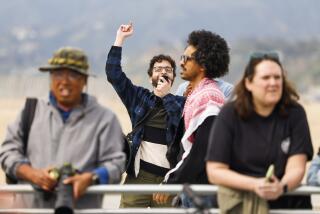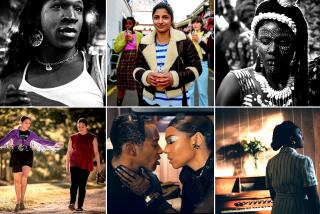How did ‘Nomadland’ win best picture? A closer look at its road to the Oscars
Eight months ago, Chloé Zhao drove from her Ojai home down the 101 Freeway to the Rose Bowl for the pop-up drive-in premiere of “Nomadland,” the poignant story of a widow grappling with grief and finding community on the road with a group of travelers. Nearing Pasadena, Zhao began noticing camper vans and RVs and wondered if they were some of the actual “nomads” who’d be attending the splashy event, billed as “Telluride from Los Angeles.” She also started seeing ash clouding the orange sky. The Bobcat fire was burning in the nearby San Gabriel Mountains, lending an apocalyptic air to what was supposed to be a celebratory evening.
Zhao was initially crestfallen, wondering whether the audience would even be able to see the makeshift screen through the soot. But as the evening unfolded and Zhao watched the film from the back of the parking lot — after taking a peek at “The Empire Strikes Back,” which happened to be playing at a drive-in next door — she came to realize that both the setting and the timing were perfect.
“I wouldn’t ask for it any other way, which goes with a philosophy I have a lot of faith in: Everything happens for a reason,” Zhao says. “It brought people closer together.”
“Nomadland,” which won the Oscar for best picture Sunday, had that effect on people. Watching Fern (played by Oscar winner Frances McDormand) go on a literal and spiritual journey of discovery proved deeply moving to its audiences and to academy members who have been largely confined to home during this past year of pandemic. That Rose Bowl screening, in fact, was the only Oscar contender many people in the industry saw outside their living rooms in the last 12 months, and it kicked off the awards season in a surreal fashion.
“You had a combination of nomads there with their rigs and a lot of Los Angeles people with their Teslas having no idea how to turn off their lights,” producer Dan Janvey remembers. “It was a really nice thing to hear people express their affection through honking horns. It’s an unusual way to feel something. It was weird.”
“Nomadland” takes home the best picture, director and lead actress awards at the 2021 Oscars.
“Nomadland” hit all the fall film festivals in one fashion or another, winning the Golden Lion at Venice (which unspooled in person for those in Europe), the audience award at Toronto (a hybrid of virtual and in-person programming) and screening as a centerpiece selection at the almost entirely virtual New York Film Festival. It emerged as the immediate best picture front-runner, earning rapturous reviews that begat several early honors from prestigious critics groups, including the National Society of Film Critics’ best picture award.
But “Nomadland’s” journey wasn’t without a couple of speed bumps. The film’s depiction of people living on society’s margins came under scrutiny, and the scenes showing Fern working in an Amazon warehouse, participating in the online retailer’s CamperForce program, were criticized for not showing the harsh workplace realities that many employees face.
“The visual power of the film and its emotional core, Fern’s grief over the loss of her husband and her former life, occupy the audience’s attention, not Amazon’s problems,” ProPublica reporter Alec MacGillis wrote. “One could easily come away from the movie having a benign view of the toll Amazon takes on its workers, including the temporary ones.”
These complaints earned a few headlines but didn’t tarnish the picture in the eyes of voters. “Nomadland” swept through the delayed awards season, winning best picture honors at the Golden Globes, Producers Guild Awards and the British Academy Film Awards and taking four Independent Spirit prizes on Thursday, including picture and director.
Indeed, the Beijing-born Zhao won nearly every directing accolade, including from the Directors Guild and BAFTA. In winning the Oscar, she became the first woman of color to earn that award and joined Kathryn Bigelow (“The Hurt Locker”) as just the second female director to be honored.
As ‘Nomadland’ joins the list of 2021 Oscar nominees today, here’s a closer look at the making of the movie and the people involved.
The win for “Nomadland” marked the fourth time in the last eight years that a Searchlight film won best picture, a remarkable run that includes “The Shape of Water” (2018), “Birdman” (2015) and “12 Years a Slave” (2014). (“Slumdog Millionaire” won in 2009.) Disney acquired the specialty studio when it bought 21st Century Fox in 2019. Steve Gilula and Nancy Utley, its longtime senior executives, recently announced their retirement, making the best picture Oscar a nice (and fitting) parting gift.
The victory for “Nomadland” felt different, due, obviously, to the tumults of the past year and their continued effect on a film industry struggling to recover. But there was another distinction, peculiar to the times, yes, but also positive in terms of access. With theaters closed or at reduced capacity, Searchlight partnered with Hulu, releasing “Nomadland” on the streaming platform Feb. 19 concurrently with its theatrical launch. Anyone who wanted to see it simply needed a decent internet connection and a Hulu membership (or trial).
“This was one that you didn’t have to wait until it came to your town to see it,” Janvey says. “It was nice for people to have that option.” He added that he hopes moviegoers will have those kinds of alternatives in the future.
Shooting “Nomadland,” Zhao built her own campervan, naming it Akira, and drove through the West, scouting locations, meeting nomads and listening to their stories. “She leads you to a place of trust,” McDormand says, “and is truly fascinated by people and their stories, which compels one to keep sharing.”
With her directing win for “Nomadland,” Chloé Zhao is in the Oscar history books as one of cinema’s great boundary breakers.
Many of those stories wound up in the movie, including a key scene with transient-living proponent Bob Wells, who spoke movingly about the grief that consumed him after the death of his son. His scene with McDormand — two people sharing the sorrow of loss — became the backbone of the film, resonating with viewers dealing with their own feelings of heartache and hardship during the last year.
“A lot of people, particularly people that age, are living that lifestyle because they’ve been put on the road through loss or grief and their recovery and they choose this lifestyle to heal from something,” Zhao says.
Zhao didn’t know that we’d all be looking to heal from something when she began filming the movie in the fall of 2018. The timing of “Nomadland’s” arrival could not have been more fortunate — for everyone.
More to Read
Only good movies
Get the Indie Focus newsletter, Mark Olsen's weekly guide to the world of cinema.
You may occasionally receive promotional content from the Los Angeles Times.











